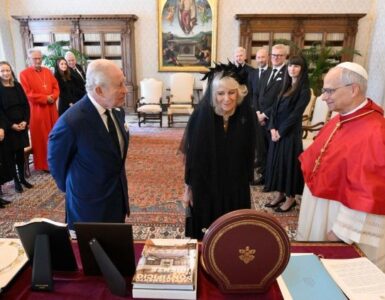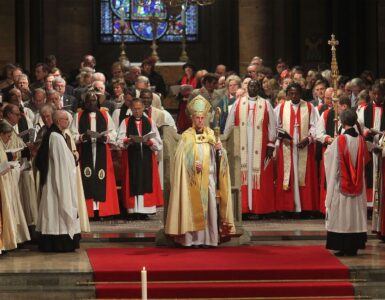By Murray Rundus
One of the foundational questions of Philosophy is naturally: What is the first thing that we know? For the Christian philosopher, this question takes on other dimensions: When can we know God? and What does this knowledge entail? The spiritual masters and Scripture itself consistently implore us to look inward to find God. But where and when does this knowledge begin? Christian philosophers have had different answers to this question, but the most significant dividing line lies between the Bonaventurians and the Thomists. St. Bonaventure asserts “that which first comes into the intellect…is the Divine Being”[1] while the Thomists take a very different approach, exemplified in the Twenty-Second Thomistic Thesis. At the root of this argument is not a question of different starting points but a divergence in epistemological starting points between Bonaventure’s theory of illumination, and the broader framework of Thomistic epistemology.
Historical Context of the Dispute
To better understand Bonaventurian thought, it is best to first understand the boundaries of the present question and how it fits into the broader thinking of the mind of the Church. It is largely said that the revival of Thomistic thought began with Pope Leo XIII’s encyclical Aeterni Patris and the subsequent institution of the Twenty-Four Thomistic Theses. However, the thought of Thomas had permeated the Church long before Pope Leo’s encyclical. The Twenty-Second Thomistic Thesis, as mentioned earlier, exemplifies this. Harvard’s Brendan Case explains that the Twenty-Second Thesis “elaborated Pope Pius IX’s earlier condemnation of ‘ontologism,’ namely the teaching—associated in the nineteenth century with the anti-Kantian Vincenzo Gioberti—that “that being, which we understand in all things and without which we understand nothing, is the divine being.”[2] The condemnation of this idea was expanded upon in the Thesis and stated that
“We do not perceive by an immediate intuition that God exists, nor do we prove it a priori. But we do prove it a posteriori, i.e., from the things that have been created, following an argument from the effects to the cause.”[3]
Not only did the Thesis uphold the condemnation from Pius IX, but it went further to embrace the Thomistic epistemology as a whole.
The Blank Slate
To understand what the Twenty-Second Thesis is asserting, it is necessary to have an understanding of this Thomistic Epistemology (Epistemology is the science of studying the validity of human knowledge.) St. Thomas in his Summa Theologiae begins with the tabula rasa (blank slate) starting point of Aristotle that man’s intellect is “a tablet on which nothing is written.”[4] From this Aquinas establishes that knowledge begins with the senses “Nihil est in intellectu quod non sit prius in sensu.” From this the sensible species derived from the senses form what is known as phantasms, from which the agent intellect abstracts universal concepts, actualizing the passive intellect.
This ‘blank slate’ thesis is something denied by St. Bonaventure, who ponders the same question and says: “One asks whether all knowledge is from the senses. We must say that it is not, for the soul knows God and itself and whatever is within it without the assistance of the exterior senses.”[5] Here we see a different position put forward, and we might observe that for St. Bonaventure, the existence of God, even here when we consider the starting point of St. Bonaventure, is assumed, and it is put on the same level as the self when it comes to what the soul first knows. The Thomistic position, on the other hand, we might say does not take the existence of God for granted in its epistemology and starts from raw sense data.
St. Bonaventure’s opinion brings a number of new notions into consideration. St. Thomas and St. Bonaventure alike share their enthusiasm for looking at things in the world and tracing them back to God. But St. Bonaventure’s interest in this subject can almost be said to be supplemental, assisting the soul in looking inward to find that knowledge of God that was already there. For St. Thomas, it is imperative that man looks at the world around him and draws this connection, as St. Thomas would say that we can only know God in this world and in our present states through His effects. St. Thomas understood the temptation to pre-suppose God’s existence and said that it “arose from their being accustomed from the beginning to hear and call upon the name of God. Now custom, especially if it date from our childhood, acquires the force of nature, the result being that the mind holds those things with which it was imbued from childhood as firmly as though they were self-evident.”[6] St. Thomas understood that the presupposition of God’s existence did have a certain strength to it, in that God’s existence is the same as His essence. For example, he gives the following argument for the self-evident nature of God’s existence in his work De Veritate:
“God’s proper name is He Who Is, as is clear from Exodus (3:14). But it is impossible to think that being is not. Therefore, it is also impossible to think that God is not.”
He also gives strength to this argument by saying “God is His own existence. But it is impossible to think that a thing is not predicated of itself, for example, that man is not man. Therefore, it is impossible to think that God does not exist.”[7]

A Response from St. Thomas
One of the ways that St. Thomas attacks this objection is to cede that there would be a strength in this objection, but a distinction makes it invalid. “If it were immediately evident to us that the divine nature is God’s existence, the argument would follow. However, at present it is not immediately evident to us, since we do not see God through His essence, but need a demonstration or faith to hold this truth.”[8] St. Thomas explains what ‘immediately evident’ means in the following passage.
“For a thing to be Immediately evident in itself, all that is needed is that the predicate pertain to the nature of the subject., For then the subject cannot be considered without it appearing that the predicate is contained in it. But for something to be immediately evident with reference to us, we have to know the meaning of the subject in which the predicate is included. Hence it is that some things are immediately evident to everybody, as, for instance, when propositions of this sort have subjects which are such that their meaning is evident to everybody, as every whole is greater than its part. For anyone knows what a whole is and what a part is. Some things, however, are immediately evident only to those with trained minds, who know the meaning of the terms, whereas ordinary people do not know them.”[9]
Still at this point there is a certain weakness in the answer to the objection stating that God’s essence and existence is the same to claim that the very statement that “God is” is enough to be self-evident. But St. Thomas answers that as well: “Now, existence is not included perfectly in the essential nature of any creature, for the act of existence of every creature is something other than its quiddity. Hence, it cannot be said of any creature that its existence is immediately evident even in itself. But, in God, His existence is included in the nature of His quiddity, for in God essence and existence are the same, as Boethius says. And that He is and what He is are the same, as Avicenna says. Therefore, it is immediately evident in itself.
But, since the essence of God is not evident to us, the fact of God’s existence is not evident to us, but has to be demonstrated. In heaven, however, where we shall see His essence, the fact of God’s existence will be immediately evident to us much more fully than the fact that affirmation and denial cannot both be true at the same time is immediately evident to us now.”[10]

The question should lead us to ask then, if God is being, and His existence and His essence the same, how is it then that the first thing we seem to understand and seem to presuppose, even in the system of tabula rasa, is that our senses exist? We may encounter concrete particulars, but how can we claim to have any knowledge of particulars without some familiarity with being preceding this? This is not a problem for the system of St. Bonaventure, as for him the first thing to fall into the intellect is pure act (the Divine Being) Himself.[11] The Thomist, on the other hand posits something known as analogous being (ens commune). We are here speaking of an analogous universal, not God Himself, as this concept of being is tied up with the being of creatures and is therefore a mix of potential and actual. St. Bonaventure dismisses such an idea in the Iternarium saying that this first being is not “particular being, which is a limited being, since any particular being is mixed with potentiality. Neither is it analogous being, for that has the least actuality, since it least exists.” [12] For St. Bonaventure, the being that first arrives in the intellect cannot come to us from something else, nor through knowing it as non-being or in this analogous being, but in pure Being itself, which explains the categories and particulars that we encounter. The Thomists here would say that this assertion is entirely unnecessary, and that the concept of analogous being is sufficient to explain our initial knowledge of Beings and provide us with the foundation to reason to Pure Being. St. Thomas in his writings frequently mentions two points that are also relevant for the present argument. Firstly, it is that we must be sure to not conflate the Order of Being and the Order of Knowing, and he would likely say that St. Bonaventure’s argument does exactly this, and secondly, he would assert that in this life, no man can see the essence of God “face to face.”
St. Bonaventure and Ontologism
The latter point leads us back to question whether or not St. Bonaventure’s position falls under the condemnation of the decrees against the ontologists. If the mind first encounters pure act, the Divine Being Himself, is this not word for word the condemnation given against the ontologists? Some modern Bonaventurians have sought to save this opinion from the ire of these condemnations by distinguishing between implicit and explicit understanding. Brenden Case writes: “Notice, however, that the condemnation does not distinguish between what we might call implicit and explicit understanding. Bonaventure’s position, at least as it is sketched in Itinerarium 5.3, expressly denies that God is the mind’s first explicit object, while affirming that we are always in some sense already acquainted with God in all our acts of knowing, just as some acquaintance with light is presupposed to, even if not explicitly thematized in, every act of vision…His point is that we cannot help but be acquainted with the reality of God, who is the uninflected ‘to be’ from which every particularborrows its being, even if we subsume that infinite reality under any number of mistaken descriptions. If ‘understand (intelligere)’ is susceptible of interpretation in either an explicit or implicit sense, then perhaps we might take Pius IX’s condemnation of ‘ontologism’ as applying, in the first instance, to explicit understanding.” Case proceeds to say that Aquinas misconstrued Bonaventure because “Bonaventure does not maintain that God is known first with any clarity or distinctness; here below, we see only through a glass darkly. Nonetheless, Bonaventure stands firmly within the long Platonist tradition in insisting that timeless truths must refer to a timeless order, which undergirds and so renders intelligible our experience of time’s ceaseless flux.”[13]
Responding to Case
I believe Case is wrong to make such a bold accusation against St. Thomas, as if he was purposefully trying to misrepresent St. Bonaventure or that the Common Doctor was ignorant of the Pauline Scripture verse. St. Thomas mentions this very Scripture verse in the context of the self-evident nature of God. St. Thomas formulates another argument for the self-evident nature:
“Cassiodorus says: ‘The soundness of the human mind understands that unapproachable glory.’ But our mind is made sound through grace. Therefore, the divine essence, which is unapproachable glory, can be seen in this life by one who has grace.”
Objecting to this, St. Thomas responds to this with the following:
“Soundness of mind is twofold. There is one by which the mind is healed from sin through the grace of faith. This soundness makes the mind see that unapproachable glory in a mirror and obscurely. The other, which will come through glory, is a remedy for all sin, punishment, and distress. This soundness makes the mind see God face to face. These two kinds of sight are distinguished in the first Epistle to the Corinthians (13:12):
“We see now through a glass in a dark manner; but then face to face.”[14]
Here we see that St. Thomas does understand that we do not see God perfectly, but sees this as strengthening his own position, that it is the sharing in God’s glory, which comes either in death or through an extraordinary mystical experience, we can see God face to face, but until then we see God darkly, reflected (as in a glass) in His effects.
As to whether or not the more contemporary Bonaventurian argument makes St. Bonaventure’s knowledge of the Divine Being an implicit one, I believe that St. Thomas would likely point out, consistent with his thinking, that this would either be in danger of committing an error of interpreting these passages to be an explicit understanding, and even if taken in the implicit sense, this becomes entirely unnecessary, as no longer is there any real knowledge or starting place of the knowledge of God, but something created in the mind, there seems to be a real danger in conflating the epistemological and the ontological orders.
Conclusion
The consequences of this debate between St. Bonaventure and St. Thomas are very important to this day. Not only is the question of asking “Where is the Philosophical starting point of knowledge?” always relevant but there is a deeper question both apologetic and theological at play. If God is said to be self-evident in the Bonaventurian sense, then on the one hand we can say that this has the apologetic advantage of allowing us to look within to discover what one already knows, albeit darkly, while at the same time having the disadvantage of seeming to unnecessarily pre-impose the faith on Philosophy, asserting God’s existence as primary before having even established Him with reason. On the other hand, the Thomist philosophy and theology can have the reputation for at times seeing quite cold and impersonal, and more modern thinkers have emphasized the importance to re-personalize the faith lest Christian philosophers forget their namesake. In my opinion, the former set of problems, the premature imposing of the faith onto one’s philosophical starting point is much more important and pressing, and I believe the Thomist position manages to present a much stronger argument in terms of consistency, but also in terms of continuity with the Magisterium of the Church and keeping Philosophy as a distinct science. While we can understand the concern of Thomism becoming too cold, this assertion works much like the ontological argument, it is a creation of the mind. And just as the ontological argument doesn’t work because of moving from a creation of the mind to an external reality, so too is it wrong to impose one’s own prejudices of a philosophical system onto reality with no real basis. Ultimately, the most personal, most love-filled philosophy will be that which is most faithful to Truth itself, precisely because it reflects the One who is Truth.
Subscribe to the paper!
Locals access: PDF version, hours of video content and more!
Physical edition

[1] St. Bonaventure, The Journey of the Mind to God, trans. Philotheus Boehner, ed. Stephen F. Brown (Indianapolis: Hackett Publishing Company, 1993), chap. V, par. 3.
[2] Brendan Case, “Bonaventure’s Critique of Thomas Aquinas,” Church Life Journal, July 27, 2022, https://churchlifejournal.nd.edu/articles/bonaventures-critique-of-thomas-aquinas.
[3] “Twenty-Two Thomistic Theses,” Thesis 22, Catholic Apologetics, accessed April 6, 2025, http://www.catholicapologetics.info/catholicteaching/philosophy/thomast.htm.
[4] Thomas Aquinas, Summa Theologiae, I, q. 84, a. 3, sed contra.
[5] St. Bonaventure, In Sent. II, d. 39, art. 1, qu. 2; II, 904b
[6] Thomas Aquinas, Summa Contra Gentiles, trans. Dominican Fathers (London: Aeterna Press, 2014), I, chap. 11.
[7] Thomas Aquinas, Quaestiones Disputatae de Veritate, q. 10, a. 12.
[8] Ibid
[9] Ibid
[10] Ibid
[11] Bonaventure, Journey of the Mind to God, chap. V, par. 3.
[12] Ibid
[13] Case, “Bonaventure’s Critique.”
[14] Aquinas, De Veritate, q. 10, a. 12.




